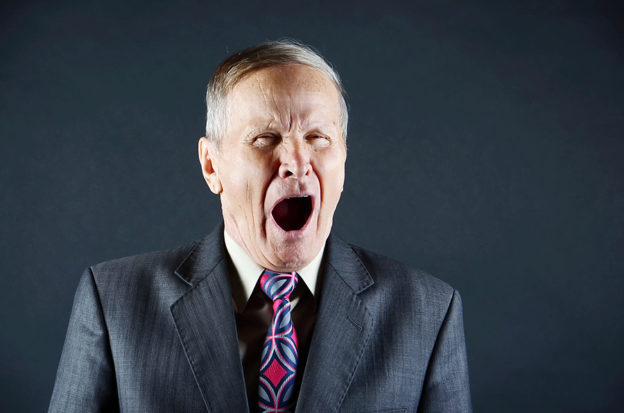By David Blyweiss, M.D., Advanced Natural Wellness
March 3, 2017
- A common but often missed cause of fatigue
- Is exhaustion making you older than your years?
- The best fatigue-fighter on earth
Does fatigue automatically come with age? Is it natural to find yourself spending more time drowsing around on the couch, watching TV and napping as you grow older?
These are questions that I hear from patients on a regular basis. Many of them are quite healthy and have no underlying conditions that contribute to feelings of exhaustion.
Yet here they are… slogging through their days at a snail’s pace… afraid that if they use any extra energy they’ll feel even more run down.
Sound familiar?
I always explain that the human body isn’t like a battery. It doesn’t run out of energy with regular use. And sitting around doing nothing isn’t going to help it “hold its charge”. In fact, sitting too much may be what’s causing your problem in the first place.
You see, when you remain inactive for too long your brain function slows down. It doesn’t get enough blood, oxygen and brain nutrients to keep you alert. And then a strange thing happens; the longer you sit, the more your brain (and body!) wants to stay put.
Open your arteries, improve blood flow for a new health miracle...
Did you know your circulatory system has over 60,000 miles of arteries, veins and other blood vessels, if stretched end to end?
But as you age, your blood vessels undergo changes, which may cause them to stiffen, thicken and get clogged.
GOOD NEWS! Doctors have now identified a “Miracle Molecule” inside your arteries that helps OPEN your arteries and IMPROVE blood flow.
It’s what Dr. Valentin Fuster calls it, "One of the most important discoveries in the history of cardiovascular medicine."To you, that means...
- Healthy blood pressure
- Sharper mind and memory
- Skyrocketing energy and muscular strength
- Increased pleasure and passion in the bedroom
- Improved circulation to every cell and organ in your body
Go here to discover a new natural way to significantly boost the levels of this miracle molecule in YOUR body NOW!
This means that the less active you are, the more fatigued you become. And that’s a big problem, since fatigue is a strong predictor of future health problems like heart disease, disability and early death.
But that’s not all.
Is Exhaustion Making You Older than Your Years?
In recent years, we’ve learned that people with fatigue often have shortened telomeres. These are the protective DNA caps on the end of your chromosomes that shorten each time your cells divide. The shorter they get, the more quickly you age.
Well, guess what?
The sedentary behavior that tends to accompany fatigue sets off a chain of events that makes your entire body age faster than it should.
It turns out that people who are the most sedentary have telomeres the same length as people who are 10 years older than they are. This means that, biologically, these inactive adults are a decade older than their more active counterparts.
So the best thing you can do to fight off fatigue, disease and aging is to get up and get moving!
Are You Suffering From...
- Love handles and a pot belly
- Romance that isn't what it used to
- Forgetfulness and inattention
- Low (or no) strength and endurance
- A sex drive that's shifted into neutral...or worse
If so...you may have Mature Male Burnout. Click here to discover more about this unique condition and what you can do about it.
The Best Fatigue-Fighter on Earth
I understand that getting up and exercising is probably the last thing you want to do if you feel exhausted all of the time. You may even think it will make you feel more worn out than you already are.
However, it’s actually the best thing you can do to shake off that tiredness.
If you’re otherwise healthy but feeling fatigued, exercising daily can reduce your fatigue by up to about 65%. At the same time, you’ll start feeling a renewed burst of energy. It even helps ease depression and feelings of exhaustion in people with serious health conditions like cancer and multiple sclerosis.
In fact, almost every single study on exercise and fatigue shows the same thing: Inactive people who get regular exercise are able to improve fatigue symptoms.
But if you’re experiencing low energy, you don’t want to rush head-first into a strenuous exercise program. You’re much better off starting slowly and working your way up to more vigorous activities. Just make sure to get your doctor’s approval before getting started.
I recommend starting off with a leisurely half-hour walk each day. About every five minutes, take 30-seconds to kick your pace up to a brisk walk.
After about a week, start adding the brisk pace every three minutes.
As your endurance and stamina improve, replace the brisk walk with a slow jog. And later, when you become even more powerful and energetic, replace the slow jog with a sprint.
The idea is to increase intensity – and add it in more frequently – over a period of time.
Once you’re on the road to full health and vigor, you can even start adding in other exercises, like jumping jacks, jump-rope, sit-ups, squats and push-ups. Just remember to add those bursts of high intensity every couple of minutes.
Before long you’ll find that your energy levels are back up to par… and you’ll feel better, healthier and younger than you have in years.
SOURCES:
Avlund K. Fatigue in older adults: an early indicator of the aging process? Aging Clin Exp Res. 2010 Apr;22(2):100-15.
Ekmann A, et al. The predictive value of fatigue for nonfatal ischemic heart disease and all-cause mortality. Psychosom Med. 2012 Jun;74(5):464-70.
Bendix L, et al. Association of leukocyte telomere length with fatigue in nondisabled older adults. J Aging Res. 2014;2014:403253.
Cherkas LF, et al. The association between physical activity in leisure time and leukocyte telomere length. Arch Intern Med. 2008 Jan 28;168(2):154-8.
Puetz TW, et al. A randomized controlled trial of the effect of aerobic exercise training on feelings of energy and fatigue in sedentary young adults with persistent fatigue. Psychother Psychosom. 2008;77(3):167-74.
Puetz TW, et al. Differential effects of exercise on cancer-related fatigue during and following treatment: a meta-analysis. Am J Prev Med. 2012 Aug;43(2):e1-24.
Pilutti LA, et al. Effects of exercise training on fatigue in multiple sclerosis: a meta-analysis. Psychosom Med. 2013 Jul-Aug;75(6):575-80.
Puetz TW, et al. Effects of chronic exercise on feelings of energy and fatigue: a quantitative synthesis. Psychol Bull. 2006 Nov;132(6):866-76.







